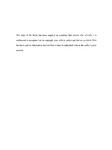Training and dual processes in human thinking
| dc.contributor.supervisor | Handley, Simon | |
| dc.contributor.author | Neilens, Helen Louise | |
| dc.contributor.other | Faculty of Science and Engineering | en_US |
| dc.date.accessioned | 2011-05-11T08:50:06Z | |
| dc.date.available | 2011-05-11T08:50:06Z | |
| dc.date.issued | 2005 | |
| dc.identifier | Not available | en_US |
| dc.identifier.uri | http://hdl.handle.net/10026.1/359 | |
| dc.description.abstract |
The aim of the research presented in this thesis was to investigate the effects of trainin- on reasoning and decision making performance. In Experiment Ia study is reported which examined the relationships between performance on a variety of reasoning tasks and measures of individual differences. Tasks employed were documented in the literature for their differential responding according to heuristic and analytic processes. The reasoning tasks to be utilised in the training studies were also validated. In Chapter 4, two statistical training studies are reported which demonstrate that analytic responding on everyday reasoning problems can be increased after instruction on the Law Of Large Numbers. Bias was eliminated, but only on written justifications of their responses. Belief-based responding was still utilised when participants were asked for a quick indication of argument strength on a rating scale. This demonstrates a dissociation between analytic and belief-based responding. A second series of experiments explored the effects of both abstract and schema-based training on selection task responding. All the training procedures resulted in positive transfer apart from training on the logic of the material conditional which facilitated perforinance on arbitrary tasks only. Relationships between perforinance on the tasks post-training and cognitive ability indicated that training was more effective for higher ability participants. The differential training effects were discussed in terrns of complexity of training procedures. The findings overall have implications for dual process theories of reasoning. The findings suggest that the interaction between training and System I and System 2 tasks/responses is a great deal more complicated than the simple analysis that is afforded by dual process accounts. | en_US |
| dc.description.sponsorship | the Economic and Social Research Council | en_US |
| dc.language.iso | en | en_US |
| dc.publisher | University of Plymouth | en_US |
| dc.title | Training and dual processes in human thinking | en_US |
| dc.type | Thesis | |
| dc.identifier.doi | http://dx.doi.org/10.24382/3572 |
Files in this item
This item appears in the following Collection(s)
-
01 Research Theses Main Collection
Research Theses Main


